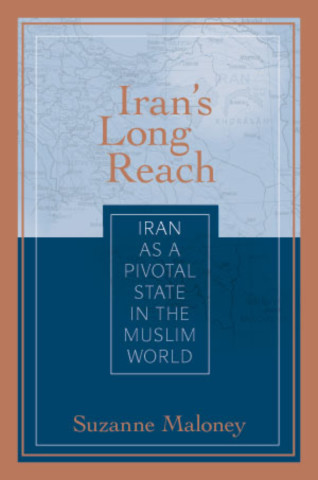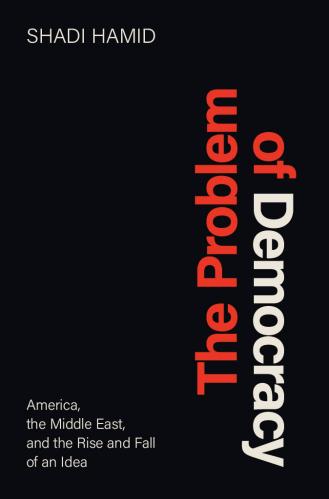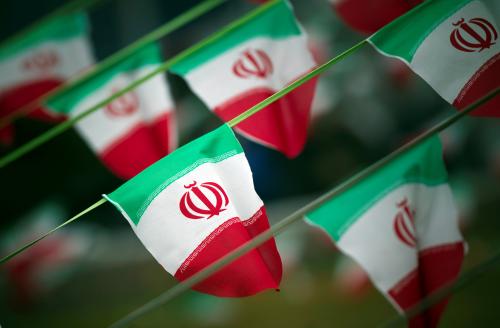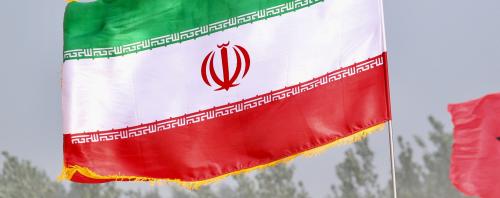Iranian protesters need to know that the members of the international community are paying close attention and not merely playing a delicate “both sides-ism” in the interest of an imaginary rapprochement with the Iranian regime, writes Shadi Hamid. We need to do with away with convenient fictions—too often used as an excuse for inaction—that a better America is a quiet one. This piece originally appeared in The Atlantic.
When protesters in the Middle East take to the streets against their regimes, the United States finds itself in a dilemma, particularly when those regimes are allies. The United States, as a statement of policy, is committed to supporting democracy abroad and standing with democracy activists and dissidents. But how does it do that if it’s also committed to the survival of governments that—also as a matter of policy—deny their citizens basic freedoms?
Certain dilemmas remain, though, even when the regimes in question aren’t friends, but rather enemies like Iran, which has witnessed its largest protests in years, spreading across more than 80 cities. The so-called “kiss of death,” where overt American support taints the very protestors the United States hopes to help, invariably comes up.
As Phil Gordon, President Obama’s White House coordinator for the Middle East, wrote days after the protests began: “We can be fairly certain that high-profile public support from the United States government will do more harm than good.” But can we? It’s certainly possible that Donald Trump is such a uniquely toxic figure that he, just by virtue of being himself, transforms the kiss of death into something real. But the premise, especially on the left, is held to apply to all American presidents; it was one of the rationales behind the Obama administration’s relative quiet in 2009 when Iranian protesters braved regime violence to protest a stolen election.
The “kiss of death” hypothesis is intuitive—after all, the United States is held under nearly universal suspicion in the Middle East, even among its proponents. So why give regimes fodder for conspiracy theories and claims of “foreign hands” instigating protests? But these claims will come regardless of what the U.S. does or doesn’t do. Iranian officials, just as they did in 2009, wasted little time blaming the United States, as well as Israel, Saudi Arabia, and even isis. (The CIA’s Michael D’Andrea—interestingly one of the most senior Muslims in the U.S. government—also received an honorable mention.)
But it is time to question this intuition, especially since Arabs and Iranians will no doubt be protesting in the years and decades to come. Since when do authoritarian regimes need evidence to assert foreign meddling? After all, if there’s no evidence, it only makes foreign interference that much more nefarious—its non-existence becoming the very proof of its existence.As for protesters themselves and how they might perceive American encouragement, Iran is something of a unique case. Despite (or, rather, because of) a virulently anti-American regime, Iranians are generally less anti-American than other populations in the Middle East. One thing Iranians, whatever their politics, will be aware of is American involvement in the 1953 coup against the country’s democratically elected prime minister, Mohamed Mossadegh—an instance, in other words, of undermining democracy, rather than supporting it.
Even in countries with notoriously high levels of anti-Americanism, such as Egypt, U.S. support, even if it’s primarily rhetorical, can provide a much-needed boost—the knowledge, however intangible, that someone, somewhere, is watching and that your cause will not be forgotten. I was living in Jordan during the first Arab spring, in 2004 and 2005, and I remember how President George W. Bush’s “freedom agenda,” as half-hearted as it turned out to be, contributed to a sense of cautious optimism among activists across the region. The Egyptian publisher Hisham Kassem might have been exaggerating when he said that “eighty percent of political freedom in this country is the result of U.S. pressure,” but even if it was 20 percent, it mattered. And it’s little accident that Egypt in 2005 saw what was, until then, one of its largest mass mobilizations in decades.
And it wasn’t just liberals or secular activists. The members and leaders of the Muslim Brotherhood I was interviewing at the time would often (sometimes with a hint of irony) offer thanks to President Bush, privately but also publicly. They may have hated Bush on other things like the Iraq War or Israel, as they were keen to note, but there was generally a grudging respect for his willingness to elevate democratic reform in U.S. policy. As the Jordanian Islamist writer Jihad Abu Eis told me: “It’s the right of Islamists to take advantage of American pressure on reform.”In the second Arab Spring, particularly in the early, optimistic years of 2011 and 2012, protesters across the region, whether in Egypt, Libya, Bahrain, or Syria, would turn their attention to the United States, pleading for help and protection. Syrian protesters, who were being gunned down daily, found themselves repeatedly disappointed by the Obama administration’s studied inaction, but that never stopped them from hoping that the United States might finally do something, anything at all, to stop the killing.
One question that the very existence of the Trump administration—and its rhetorical downgrading of democracy promotion—raises is whether America’s moral legitimacy and authority is a renewable resource. Of course, this doesn’t mean the United States was ever particularly able or willing to convert its pro-democracy rhetoric into policy. In fact, the record is mostly one of subverting democracy, rather than promoting it. But there was the pretense—and the rest of us, as Americans, could hold our government to those stated ideals. And, as bad as the United States may have been, it was usually better than the alternatives, whether various European countries, or China and Russia.
When it comes to autocratic allies, like Saudi Arabia or Egypt, the Trump administration has been indulgent. The idea, often unstated, that America should highlight democracy with its enemies but stay quiet with its allies is deeply problematic. But that is not Iranians’ concern, at least not the ones protesting, or the ones who will protest in the future. They need to know that the members of the international community, including America’s European allies, are paying close attention and not merely playing a delicate “both sides-ism” in the interest of an imaginary rapprochement with the Iranian regime. The conversation we need to prepare ourselves for—since this is more likely the beginning than the end—is what can be done to support the forces of reform in Iran, however limited America’s power and leverage might be. But, to prepare ourselves for that conversation, we need to do with away with convenient fictions—too often used as an excuse for inaction—that a better America is a quiet one.
The Brookings Institution is committed to quality, independence, and impact.
We are supported by a diverse array of funders. In line with our values and policies, each Brookings publication represents the sole views of its author(s).









Commentary
Iran’s protests and the myth of benign silence
January 10, 2018